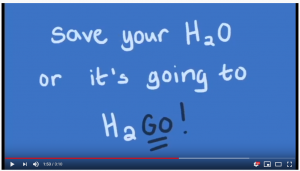If you were asked to educate someone about the wastewater treatment process in just 30 seconds or less, what would you say?
That is the challenge the Florida Water Environment Association (FWEA) is posing to the state’s high schoolers. FWEA, a Water Environment Federation (Alexandria, Va.) Member Association, is calling on young Floridians to create short, informational videos about what happens to used water.
The “Once Upon A Flush” High School Video Contest, open for submissions until Feb. 10, “challenges students to think about where their used water goes and what does or does not belong down the toilet,” said Shea Dunifon, Education Coordinator for Pinellas County (Fla.) Utilities. Dunifon also is Vice Chair of the FWEA Public Communications and Outreach Committee (PCOC).
“Our intention is not only to have the students do research and learn about the water and wastewater processes, but also to educate their family … and create a new way to see this issue,” said Melody Gonzalez, a member of the FWEA PCOC.
Bridging the Awareness Gap
Research suggests that most people have only a vague idea (at best) of what happens to used water. “Many high school students, and even adults, believe that wastewater is pumped directly into the oceans without treatment,” Dunifon said. “Others simply don’t know or admit to having never thought about where their wastewater goes.”

The Florida Water Environment Association (FWEA) is accepting short video submissions for its “Once Upon A Flush” High School Video Contest through Feb. 10, 2020. To win the competition, Florida high school students will need to demonstrate their familiarity with the wastewater treatment process while putting their creativity on display. Image courtesy of FWEA
At the same time, social media and other communication technologies mean more topics are vying for the attention of young people than ever before.
FWEA sees its video contest as a way to combat unawareness without the time commitment typically associated with learning about an unfamiliar topic. Contest entries are capped at 30 seconds.
However, the videos can take nearly any form — an animation, a newscast, a skit, even a music video. Each video must creatively convey where water goes after household use or what happens when the wrong things are flushed down toilets. Students can submit videos individually or as a team.
PCOC members will judge the videos, paying special attention to alignment with the contest’s theme, factual accuracy, creativity, and how much the video empowers viewers to pay more attention to their flushing habits.
The first-place winner will receive $1,000 as well as an additional $450 to benefit their high school. FWEA will promote the winning submissions on social media channels.
Volunteers Make A Difference
FWEA piloted its first high school video competition in 2017. They drew inspiration from a similar contest held by the Russian River Watershed Association (Ukiah, Calif.) to solicit videos about water conservation. During the pilot, the contest targeted only a small area to test the concept and still received seven entries, said Debbie Sponsler, PCOC member.

This year’s “Once Upon A Flush” High School Video Contest follows a pilot competition held in 2017. Click here to watch the 2017 winning videos.
For the current competition, FWEA has mobilized a wider network of volunteers to help administer the contest. Dedicated FWEA members aided the scale-up, Dunifon said.
“One of the greatest challenges we’ve faced is promoting the competition amongst the schools,” Dunifon said. “As the competition grows, another challenge will be recruiting enough FWEA volunteers to promote, accept student video submissions, and judge the entries.”
Organizing the contest and recruiting volunteers can be time-consuming, but increasing the visibility of wastewater treatment among young people is a worthy cause, Dunifon said.
“We believe that it is never too early to start educating the next generation, making them aware of the challenges the industry faces on a daily basis, and how to contribute to make improvements and become more sustainable in the future,” Gonzalez said. “After all, one day they will become the leaders in the community.”
Click to get more details about the “Once Upon A Flush” High School Video Contest. Keep up to date with the entries and winners on the FWEA Facebook page.
The FWEA video contest volunteers include Chuck Olson (PCOC Chair), Shea Dunifon (PCOC Vice Chair), and PCOC members Debbie Sponsler, Melody Gonzalez, and Mary Cox Rose.
─ Justin Jacques, WEF Highlights








January 9, 2020
Participate